The Smart Plant Based Food Packaging Market is estimated to be valued at USD 291.5 billion in 2025 and is projected to reach USD 576.1 billion by 2035, registering a compound annual growth rate (CAGR) of 7.1% over the forecast period.
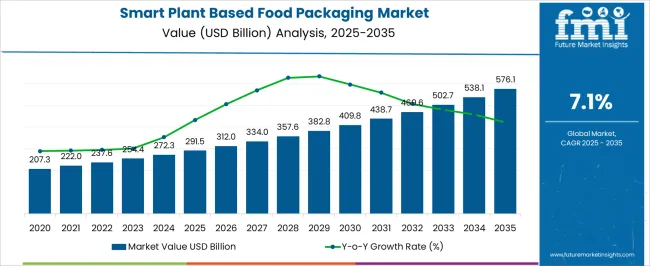
| Metric | Value |
|---|---|
| Smart Plant Based Food Packaging Market Estimated Value in (2025 E) | USD 291.5 billion |
| Smart Plant Based Food Packaging Market Forecast Value in (2035 F) | USD 576.1 billion |
| Forecast CAGR (2025 to 2035) | 7.1% |
The Smart Plant Based Food Packaging market is witnessing strong growth, driven by rising consumer demand for sustainable and eco-friendly packaging solutions. Increasing awareness regarding plastic pollution and environmental sustainability has prompted both manufacturers and retailers to adopt plant-based alternatives that reduce carbon footprint and support circular economy principles. Technological advancements in biodegradable, compostable, and recyclable materials are enhancing the functionality, durability, and shelf life of food packaging, while maintaining environmental compliance.
Growing regulatory pressure on single-use plastics and stricter waste management laws are accelerating adoption across regions. Innovations in smart packaging technologies, including embedded freshness indicators, anti-microbial coatings, and temperature-sensitive labels, are enhancing consumer convenience and food safety.
Rising investments in research and development by key packaging companies are driving product innovation and improving cost efficiency The convergence of consumer awareness, environmental policies, and technological innovation positions the market for sustained growth, with significant opportunities emerging in both retail and food service segments worldwide.
The smart plant based food packaging market is segmented by material, technology, and geographic regions. By material, smart plant based food packaging market is divided into Papers & Paperboard, Metal, Polymer Nanocomposites, Glass, Bioplastic, and Others. In terms of technology, smart plant based food packaging market is classified into Biodegradable Packaging, Aseptic Packaging, Controlled Packaging & Active Packaging, and Intelligent Packaging. Regionally, the smart plant based food packaging industry is classified into North America, Latin America, Western Europe, Eastern Europe, Balkan & Baltic Countries, Russia & Belarus, Central Asia, East Asia, South Asia & Pacific, and the Middle East & Africa.
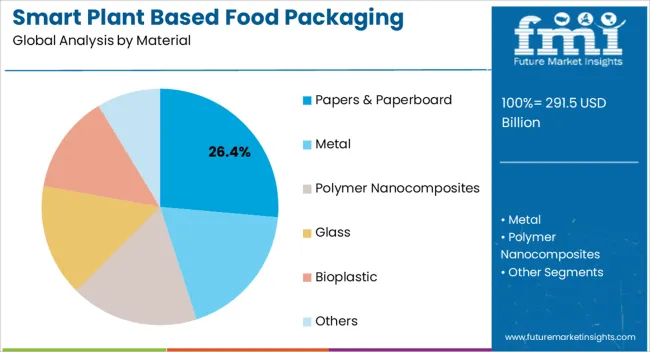
The papers and paperboard material segment is projected to hold 26.4% of the market revenue in 2025, establishing it as the leading material type. This growth is being driven by the segment’s sustainability profile, cost-effectiveness, and versatility in packaging applications. Paper-based materials offer biodegradability and recyclability, aligning with environmental compliance and corporate sustainability goals.
They can be easily processed into cartons, trays, and containers with varying thicknesses and coatings to enhance strength and barrier properties. The material’s compatibility with printing technologies supports brand visibility and consumer engagement through innovative designs. Rising demand from retail, ready-to-eat meals, and takeaway food segments has reinforced adoption.
Technological improvements in fiber sourcing, coating, and lamination have enhanced durability and moisture resistance, enabling wider applications As sustainability standards and eco-conscious consumer preferences continue to rise, papers and paperboard are expected to maintain a leading position, driven by their environmental advantages and adaptability in modern food packaging solutions.
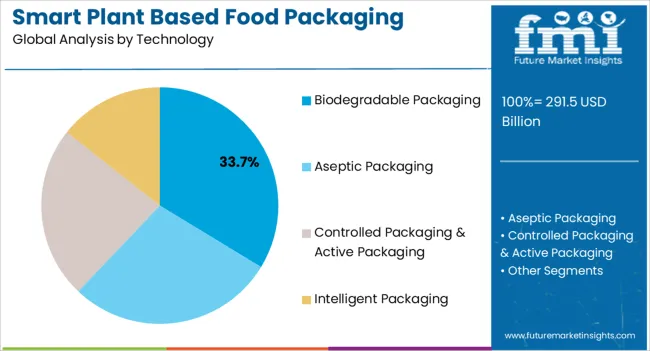
The biodegradable packaging technology segment is anticipated to account for 33.7% of the market revenue in 2025, making it the leading technology category. Growth in this segment is being driven by regulatory mandates to reduce single-use plastics and increasing consumer demand for environmentally friendly packaging alternatives. Biodegradable technologies, including plant-based polymers and natural fiber composites, enable packaging to decompose under natural conditions, reducing landfill waste and environmental impact.
Integration of smart features, such as freshness indicators, temperature sensors, and antimicrobial coatings, enhances product safety, shelf life, and consumer engagement. Manufacturers are increasingly adopting these technologies to meet sustainability targets, differentiate products, and comply with evolving environmental regulations.
Continuous research and innovation in biodegradable formulations, including strength enhancement and barrier properties, are improving performance and expanding application across retail, food service, and e-commerce channels As environmental awareness and regulatory pressure continue to rise, biodegradable packaging is expected to remain a primary driver of market growth, supported by advancements in plant-based materials and smart packaging solutions.
Food packaging is essential for containment of products, preservation and protection, to reduce food spoilage, eliminating the risk of adulteration and present food in a hygienic and aesthetically attractive way.
According to the Agriculture and Food Organization, one third of the food in the world is wasted and most of this wasted food is generated by retailers and consumers who follow dates on packages and throw away edible food due to a label.
Therefore, a project was initiated in order to develop smart plant based food packaging which increases the shelf life of food and the researchers also have formulated sensors that notify the consumers and retailers whether the food inside can be consumed or not. The global smart plant based food packaging is expected to register a healthy growth rate over the forecast period.
The global smart plant based food packaging market is driven by various factors which includes eminent advantages of smart plant based food packaging and demand from food & beverage industry.
Smart plant based food packaging not only extend the life of the food product but also eliminates the need for environment-harming plastic. The global smart plant based food packaging market can be segmented on the basis of product type, material type and as per the region.
On the basis of product type, the global smart plant based food packaging market is segmented into blow moulded, pot designed and others. On the basis of material type, the global smart plant based food packaging market is divided into cellulose based film and blow moulded film. On the basis of region, the global smart plant based food packaging market is segmented into North America, Europe and the emerging countries of Asia Pacific.
Safety of food products has become a top priority of consumers on a global scale. Increasing awareness among the consumers regarding the environmental concerns and gradual change in buying habits, which in turn is anticipated to propel the smart plant based food packaging market.
Biodegradable plant based polymers in smart plant based food packaging is manufactured by cultivating carbohydrates via bacteria, while bio plant based polymers are macromolecules derived from plant residues.
This provides the smart plant based food packaging improved food preservative properties. It is mainly designed to extend shelf life of the food and also to protect the contents from its surroundings. Standard packaging permits the entry of air which places limitations on shelf life of the food.
There are lot of opportunities that exists for smart plant based food packaging in the food packaging market in the developing economies as the food packaging technology is making huge progress in these regions, which in turn is anticipated to drive the global smart plant based food packaging market globally.
North America is leading the smart plant based food packaging market followed by the Asia Pacific and Europe market for smart plant based food packaging. However, the growth rate shown in these regions have subsided considerably as the smart plant based food packaging market is close to its peak. This growth is however restored by the high growth rate of smart plant based food packaging market in regions of Asia Pacific which includes China, India and Latin America.
Smart plant based food packaging is one of the areas where food packaging companies can emphasize on refining their practices. Reutilizing in-house and using eco-friendly and/or recyclable packaging is another step, but making smart plant based food packaging materials means using more biodegradable products.
Heinz, Coca-Cola and SINTEF are the major companies participating in the movement towards the use of smart plant based food packaging. Coca-Cola uses Brazilian sugarcane but is also looking into other plant based materials. Currently all of the company’s bottles are made of fully recyclable plastic using bio-based products whereas SINTEF is now ready to present the first demonstration of packaging made from polyactic acid.
The company has partnered with other collaborators like Logoplaste and Greek company Agro to develop smart plant based food packaging.
Other food packaging companies need to find if they can alter their packaging necessities and fit smart plant based food packaging material in their budget for which the USDA has proposed a loan guarantee program which will give smart plant based food packaging manufacturers easy access to loan and also cheaper interest rates in order to build a new plant.
The research report presents a comprehensive assessment of the market and contains thoughtful insights, facts, historical data, and statistically supported and industry-validated market data. It also contains projections using a suitable set of assumptions and methodologies. The research report provides analysis and information according to market segments such as geography, technology and applications.
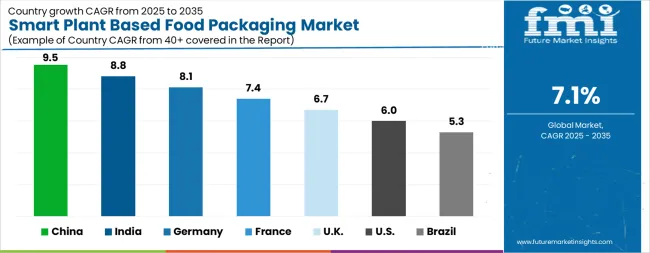
| Country | CAGR |
|---|---|
| China | 9.5% |
| India | 8.8% |
| Germany | 8.1% |
| France | 7.4% |
| UK | 6.7% |
| USA | 6.0% |
| Brazil | 5.3% |
The Smart Plant Based Food Packaging Market is expected to register a CAGR of 7.1% during the forecast period, exhibiting varied country level momentum. China leads with the highest CAGR of 9.5%, followed by India at 8.8%. Developed markets such as Germany, France, and the UK continue to expand steadily, while the USA is likely to grow at consistent rates. Brazil posts the lowest CAGR at 5.3%, yet still underscores a broadly positive trajectory for the global Smart Plant Based Food Packaging Market. In 2024, Germany held a dominant revenue in the Western Europe market and is expected to grow with a CAGR of 8.1%. The USA Smart Plant Based Food Packaging Market is estimated to be valued at USD 100.3 billion in 2025 and is anticipated to reach a valuation of USD 179.5 billion by 2035. Sales are projected to rise at a CAGR of 6.0% over the forecast period between 2025 and 2035. While Japan and South Korea markets are estimated to be valued at USD 13.2 billion and USD 8.3 billion respectively in 2025.
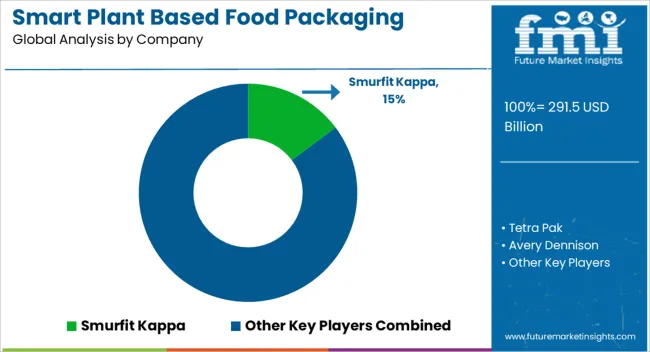
| Item | Value |
|---|---|
| Quantitative Units | USD 291.5 Billion |
| Material | Papers & Paperboard, Metal, Polymer Nanocomposites, Glass, Bioplastic, and Others |
| Technology | Biodegradable Packaging, Aseptic Packaging, Controlled Packaging & Active Packaging, and Intelligent Packaging |
| Regions Covered | North America, Europe, Asia-Pacific, Latin America, Middle East & Africa |
| Country Covered | United States, Canada, Germany, France, United Kingdom, China, Japan, India, Brazil, South Africa |
| Key Companies Profiled | Smurfit Kappa, Tetra Pak, Avery Dennison, PlantPack, BASF, Stora Enso, Biopak, Eco-Products, Loop Industries, NatureWorks, Cascades, Mondi Group, BioPak, Pulpex, and Milea |
The global smart plant based food packaging market is estimated to be valued at USD 291.5 billion in 2025.
The market size for the smart plant based food packaging market is projected to reach USD 576.1 billion by 2035.
The smart plant based food packaging market is expected to grow at a 7.1% CAGR between 2025 and 2035.
The key product types in smart plant based food packaging market are papers & paperboard, metal, polymer nanocomposites, glass, bioplastic and others.
In terms of technology, biodegradable packaging segment to command 33.7% share in the smart plant based food packaging market in 2025.






Our Research Products

The "Full Research Suite" delivers actionable market intel, deep dives on markets or technologies, so clients act faster, cut risk, and unlock growth.

The Leaderboard benchmarks and ranks top vendors, classifying them as Established Leaders, Leading Challengers, or Disruptors & Challengers.

Locates where complements amplify value and substitutes erode it, forecasting net impact by horizon

We deliver granular, decision-grade intel: market sizing, 5-year forecasts, pricing, adoption, usage, revenue, and operational KPIs—plus competitor tracking, regulation, and value chains—across 60 countries broadly.

Spot the shifts before they hit your P&L. We track inflection points, adoption curves, pricing moves, and ecosystem plays to show where demand is heading, why it is changing, and what to do next across high-growth markets and disruptive tech

Real-time reads of user behavior. We track shifting priorities, perceptions of today’s and next-gen services, and provider experience, then pace how fast tech moves from trial to adoption, blending buyer, consumer, and channel inputs with social signals (#WhySwitch, #UX).

Partner with our analyst team to build a custom report designed around your business priorities. From analysing market trends to assessing competitors or crafting bespoke datasets, we tailor insights to your needs.
Supplier Intelligence
Discovery & Profiling
Capacity & Footprint
Performance & Risk
Compliance & Governance
Commercial Readiness
Who Supplies Whom
Scorecards & Shortlists
Playbooks & Docs
Category Intelligence
Definition & Scope
Demand & Use Cases
Cost Drivers
Market Structure
Supply Chain Map
Trade & Policy
Operating Norms
Deliverables
Buyer Intelligence
Account Basics
Spend & Scope
Procurement Model
Vendor Requirements
Terms & Policies
Entry Strategy
Pain Points & Triggers
Outputs
Pricing Analysis
Benchmarks
Trends
Should-Cost
Indexation
Landed Cost
Commercial Terms
Deliverables
Brand Analysis
Positioning & Value Prop
Share & Presence
Customer Evidence
Go-to-Market
Digital & Reputation
Compliance & Trust
KPIs & Gaps
Outputs
Full Research Suite comprises of:
Market outlook & trends analysis
Interviews & case studies
Strategic recommendations
Vendor profiles & capabilities analysis
5-year forecasts
8 regions and 60+ country-level data splits
Market segment data splits
12 months of continuous data updates
DELIVERED AS:
PDF EXCEL ONLINE
Smart School Bus Platform Market Size and Share Forecast Outlook 2025 to 2035
Smart Home Wireless Smoke Detector Market Size and Share Forecast Outlook 2025 to 2035
Smart Bus Platform Market Size and Share Forecast Outlook 2025 to 2035
Smart Vision Processing Chips Market Size and Share Forecast Outlook 2025 to 2035
Smart Touch Screen Scale Market Size and Share Forecast Outlook 2025 to 2035
Smart Magnetic Drive Conveyor System Market Size and Share Forecast Outlook 2025 to 2035
Smart Wheelchair market Size and Share Forecast Outlook 2025 to 2035
Smart Mining Technologies Market Size and Share Forecast Outlook 2025 to 2035
Smart Parking Market Size and Share Forecast Outlook 2025 to 2035
Smart Digital Valve Positioner Market Forecast and Outlook 2025 to 2035
Smart Card IC Market Size and Share Forecast Outlook 2025 to 2035
Smart-Tag Inlay Inserters Market Analysis - Size and Share Forecast Outlook 2025 to 2035
Smart TV Market Forecast and Outlook 2025 to 2035
Smart/AI Toy Market Size and Share Forecast Outlook 2025 to 2035
Smart Locks Market Size and Share Forecast Outlook 2025 to 2035
Smart Sprinkler Controller Market Size and Share Forecast Outlook 2025 to 2035
Smart Indoor Gardening System Market Size and Share Forecast Outlook 2025 to 2035
Smart Building Delivery Robot Market Size and Share Forecast Outlook 2025 to 2035
Smart Watch Market Size and Share Forecast Outlook 2025 to 2035
Smart Label Market Size and Share Forecast Outlook 2025 to 2035

Thank you!
You will receive an email from our Business Development Manager. Please be sure to check your SPAM/JUNK folder too.
Chat With
MaRIA